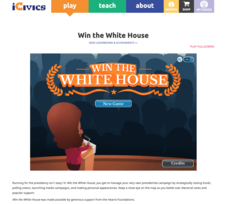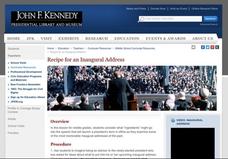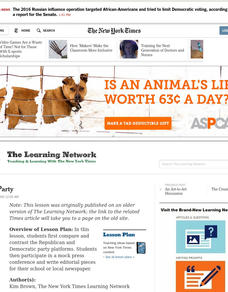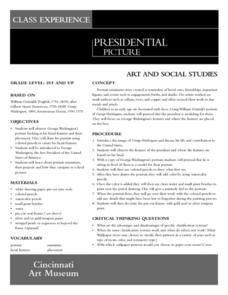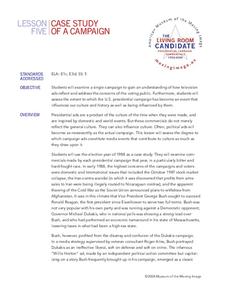Curated OER
Executive Decisions
Students examine the reasons behind key presidential decisions throughout American history and, by debating the pros and cons of these decisions in retrospect, students consider how these decisions affect us still today.
Curated OER
The Age of Jackson
Students study the image of Andrew Jackson. For this presidential history lesson students investigate the political image that was groomed by Jackson as they examine advertisements. Students compose essays regarding the topic.
Curated OER
Resolving Kennedy's Legacy
Students examine the Kennedy presidency. In this presidential history lesson, students watch "Resolving Kennedy's Legacy." Students then discuss the provided questions regarding the presidency and write position papers about about the...
Curated OER
The Man Who Made the Presidency
High schoolers explore the contributions that George Washington made to the presidency. In this presidential history lesson, students analyze primary and secondary sources regarding Washington and the precedents he set. High schoolers...
Curated OER
Meet the Press: American Presidents
Students interpret historical evidence presented in primary and secondary resources. In this presidential history lesson, students research the accomplishments of George Washington, Abraham Lincoln, Frankiln D. Roosevelt, and Barack...
Curated OER
The Brief American Pageant:The Triumphs and Travails of the Jeffersonian Republic
Add these slides into your lecture about the Jeffersonian Era in American history. Slides detail the results of the Presidential Election of 1800, four Barbary states of North Africa (Morocco, Algeria, Tunisia, and Tripoli) and the...
National Endowment for the Humanities
George Washington: The Precedent President
Everyone knows that George Washington was the first president, but do your scholars know why that was so important? The lesson plan, the third in a sequence of three, allows learners to understand how George Washington set a precedent...
iCivics
Win the White House
What does it take to win the White House? A video game allows young political operatives to try their hand at winning 1600 Pennsylvania Avenue by deciding on key issues, where and how to spend campaign dollars, and the role of polling...
John F. Kennedy Presidential Library & Museum
Recipe for an Inaugural Address
An inaugural address represents the first moments of a new beginning. Using John F. Kennedy's speech as a model for guided practice, groups examine the ingredients of an inaugural address. Individuals then repeat the analysis process...
Classroom Law Project
What does the Constitution say about voting? Constitutional Amendments and the Electoral College
As part of a study of voting rights in the US, class members examine Constitutional amendments connected with voting and the role of the Electoral College in the election process.
Mikva Challenge
The Great Electoral Race Kickoff
Do young people care about elections? Host a discussion about the role of young citizens in the electoral process with an engaging social studies lesson. As high schoolers read and respond to four statements about youth interest in...
iCivics
Mini-Lesson: Executive Orders
Can the President of the United States pass a law all by himself? Scholars investigate the concept of the executive order in regards to the powers of the presidency. They use current issues and events to monitor media bias while also...
ProCon
President Bill Clinton
Was Bill Clinton a good president? Scholars set out to answer the question as they prepare for a class debate on the topic. They watch videos, review pros and cons, and read facts about the process of becoming a United States president....
University of Richmond
The Executive Abroad 1905-2016
While the president often appears to jet around the world on diplomatic missions, having the commander in chief travel abroad is a modern phenomenon, starting in the 20th century. Using a graphic, learners explore which presidents...
Constitutional Rights Foundation
270 Votes to Win: The Electoral College in the United States
What exactly is the Electoral College and how does it work? The instructional activity is part of a larger series on government that explains what the Electoral College is and how it helps determine an election winner. Academics...
Constitutional Rights Foundation
The Troubled Elections of 1796 and 1800
Congress does more than create new laws. Political scientists delve into the elections of 1796 and 1800 to understand how political parties, the Electoral College, and personal agendas affected the election process. The resource also...
Curated OER
It's My Party
Students compare/contrast the Republican and Democratic platforms using Venn diagrams, then read and discuss, "The Conventions Are Over. The Party's Just Starting." students then participate in a mock press conference and write editorial...
Curated OER
Presidential Picture
Students create miniature portraits of George Washington using a primary source image, watercolor pencils, colored pencils and white drawing paper. This Art lesson can be used as an introductory lesson on George Washington in a U.S....
Curated OER
Citizens of the Future
Young sociologists explore how local, state, and federal governments work. This very impressive and ambitious lesson requires pupils to contact government officials who represent them and their families. They research elections, and hold...
Curated OER
1912: The Election that Changed the Century
The presidential election of 1912 was a turning point in American politics. Whoever won would reshape the political spectrum. Learn about the key issues, each party's politics, and the four men who wanted to become president: William...
Curated OER
The Election Is in the House: 1824: The Candidates and the Issues
High schoolers list some changes in presidential election laws and/or procedures since 1796, and cite examples from presidential campaign materials from 1824.
Curated OER
Down for the Count?
The New York Times article “Supreme Court, Split 5-4, Halts Florida Count in Blow to Gore” provides the opening to an assessment of the United States Supreme Court decision in the case of the 2000 presidential election. Assuming the...
Middle Tennessee State University
Fights, Freedom, and Fraud: Voting Rights in the Reconstruction Era
As part of a study of post Civil War era, young historians investigate the changes in voting rights during the Reconstruction Era (1863-1876), the fraud involved in the Hayes-Tilden presidential election of 1876, and efforts by Pap...
Curated OER
Case Study of a Campaign
Students read a case study of one campaign to discover how political campaigns addresses the needs of the voters. In groups, they answer questions related to the case and discuss how the commercials affect society as a whole. They use...
Other popular searches
- Presidential Inauguration
- Presidential Elections
- Presidential Protection
- Presidential Duties
- Presidential Cabinet
- 2000 Presidential Election
- 2008 Presidential Elections
- Presidential Election Voting
- Presidential Biographies
- Presidential Debate
- Presidential Powers
- Presidential Campaigns









